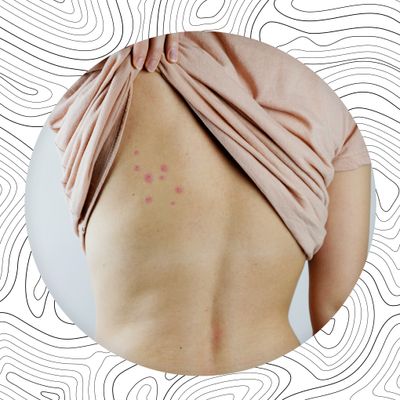
Despite countless upsides, summer weather also has its indignities — pollen allergies, sunburn, and nonstop sweating, to name a few. And then, of course, there’s one so awful that it drives some of us indoors altogether: bugs.
We’ve all experienced bug bites in our lives, but some individuals are like catnip for mosquitoes — that person who gets eaten alive at the barbecue while everyone else is fine. If that’s you, you can blame your literal bloodline. “Being more attractive to bugs is definitely a real phenomenon, and it’s heritable — you can pass on the genes to your children,” confirms professor James Logan, an arthropod specialist and head of disease control at the London School of Hygiene & Tropical Medicine.
According to Dr. Logan, some people do attract bugs more or less than others, and it all comes down to body odor. “Roughly 10 percent of people get bitten very infrequently, and that’s because their bodies produce natural repellants, which are found in their sweat,” he explains. “The compounds that repel insects belong to the chemical classes aldehydes and ketones, and people who don’t get bitten produce these chemicals in higher amounts than those who do. But what we don’t know is where exactly the compounds are produced — it might be by the skin cells or bacteria that lives on the skin or something else.”
Identifying where this production happens is an ongoing area of research. One day, he says, a pill could be developed that would make the body produce these natural repellants.
But until that magic pill arrives, the rest of us will suffer — and some much more than others. If you’re someone who is constantly bitten, it’s most likely because you don’t produce these natural repellants in your blood, so you’re basically a porterhouse steak to a mosquito.
For those who can’t rely on their body odor to repel bugs naturally, there’s bug spray. “The most common bug repellent is an ingredient called DEET, and it’s very effective,” says Dr. Logan. Its name is shorthand for diethyl toluamide, the active chemical it contains, and while its exact effects aren’t fully understood, mosquitos seem to sense it through their feet when they land on you and won’t bite. It also works on other harmful bugs like ticks.
Dr. Logan notes that while people are sometimes nervous about using DEET, given its strong chemical makeup, it’s “very safe” and works better than the other bug repellants on the market. The only thing to be wary of is obvious — don’t ingest it. “If you’re applying it to children, be sure to apply it to your hands and then rub it into them. Kids are forever putting their fingers in their mouths, so you want to avoid them having it on their hands,” he cautions. If you do get a small amount into your mouth (say, by eating chips with your bug-sprayed hands), you’ll be fine — it shouldn’t do more than taste gross or give you a mildly upset stomach. But if you somehow manage to swallow a lot of it, it can cause more serious side effects like vomiting and seizures.
Aside from bug spray, Dr. Logan recommends wearing loose outfits. “Insects will bite through all kinds of clothing, including jeans,” he says. “So the looser your clothes are, the better, because then hopefully the bug will just bite through a fold in your clothes and not your skin.” You can also avoid sitting outdoors at dawn and dusk when insects tend to be most active, and use mosquito nets at night if you’re concerned about getting bitten in your sleep. As for theories that wearing certain perfumes or even eating specific foods can make your body odor more attractive to bugs, Dr. Logan says there’s “very little evidence” to substantiate this — so there’s no need to ditch your summer fragrance or change your diet.
If you still get bitten, Dr. Logan advises taking an antihistamine to help with itching and to avoid touching or scratching the bite. “In some rare cases, a bite can get infected, and if you pierce the skin with your nail, that’s more likely, so try to leave it alone,” he says.
In the U.S., bug bites are usually an annoyance and not a cause for grave concern, but some more humid, swampy areas (like Florida) do have outbreaks of dengue fever or the West Nile virus. Likewise, watch out for horseflies, which you probably won’t miss. “Horseflies really hurt when they bite, as they have really sharp teeth,” says Dr. Logan. “They are often found around animals, and because of that, they are more likely to cause an infection because they may have picked up bacteria from the animal.” Finally, regular tick checks are a good idea if you (or your pets) have been in wooded areas. If any bite is very large or painful or you start to develop other symptoms like a fever, nausea, dizziness, or localized swelling, the CDC advises seeking medical attention.
If you’re overseas, always check the CDC website for specific guidance on bugs in the countries you’re visiting, as diseases like Zika, malaria, and yellow fever can be passed through bug bites.
Good luck to the bug-delicious people out there, and may your DEET be plentiful.

